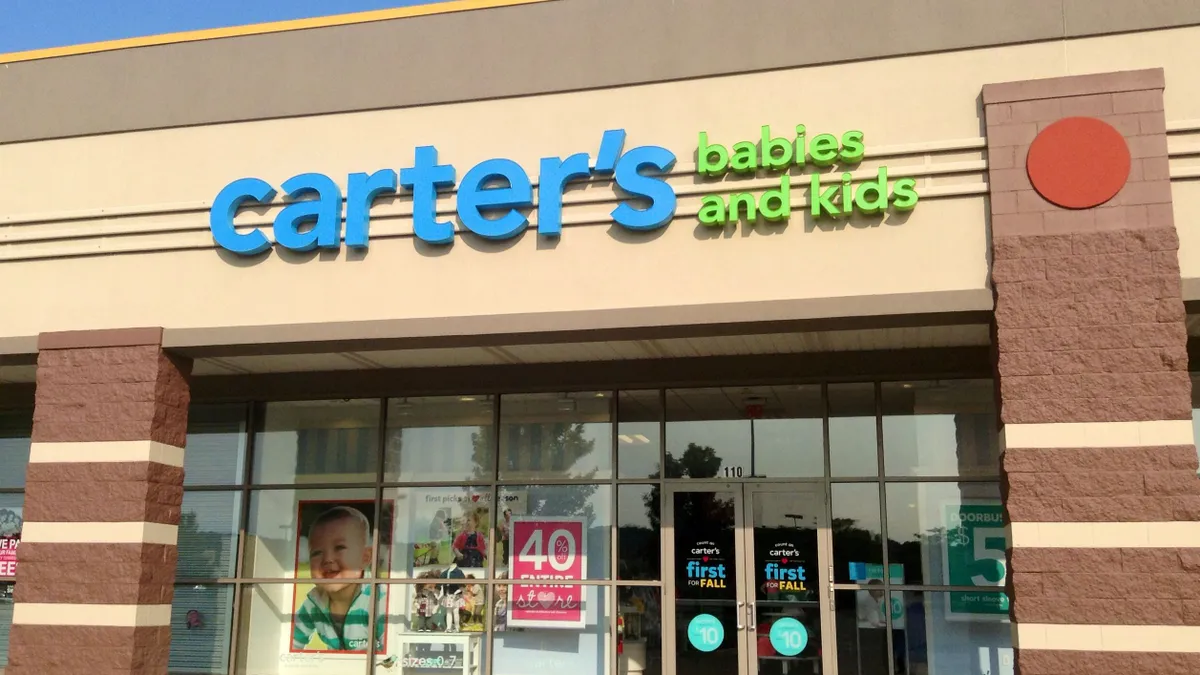Dive Brief:
- Children’s apparel company Carter’s reported that its Q1 net sales declined 4.8% year over year to $629.8 million. Its net income decreased nearly 60% to $15.5 million compared to the year-ago quarter, according to a Friday press release.
- In the U.S., its retail comparable net sales declined 5.2% compared to the previous year. However, its e-commerce sales outperformed its brick-and-mortar business, the company said.
- Carter’s did not provide 2025 guidance, citing its recent leadership transition and ongoing economic uncertainty stemming from President Donald Trump’s tariffs. The proposed higher tariffs could result in “meaningful increases to our product costs, if not otherwise mitigated,” Chief Financial Officer and Chief Operating Officer Richard Westenberger told analysts on an earnings call.
Dive Insight:
Carter’s now has a new chief executive at its helm as it weathers the impact of President Trump’s tariffs.
Earlier this month, Van’s veteran Douglas Palladini became the company’s CEO, succeeding interim CEO Westenberger. Westenberger continues to serve in his previous positions as chief financial officer and chief operating officer. The company’s CEO shuffle began in January when Michael Casey retired as chief executive and transitioned into an advisery role, the company noted in its earnings release.
Palladini, who started in his role on April 3, said that his goal is to return Carter’s to growth. “And not just any growth, by the way, but quality, sustainable, long-term and accretive growth,” he told analysts. “We are not going to buy sales. Our goal is to earn them. We're not going to BOGO our way to sales growth. Our goal is to increase profitability. Our ideal is to grow Carter's consistently and sustainably.”
Retailers are currently trying to navigate the impact of tariffs on their businesses. Executives from Walmart, Home Depot and Target, for example, recently met with President Trump regarding the proposed tariffs on U.S. imports. All three companies described the meeting as constructive.
Tariffs pose an elevated risk to discretionary product categories, including apparel, according to a report from PitchBook.
Raising prices due to tariff increases is under evaluation, Westenberger said on the company’s earnings call. “This obviously is not our preference,” he said. “The proposed tariffs have the potential to raise prices on a range of essential items, including our products that families with young children rely upon.”
The company has raised prices on a number of items, with a focus on its Skip Hop brand. It has also partnered with some of its vendors to share costs and is “continuing to move production around to lower tariff geographies,” Westenberger said.
Carter’s over the years has reduced its reliance on China, with Vietnam, Cambodia, Bangladesh and India representing its largest countries of origin, according to the company.
Like a number of other retailers, Carter’s is waiting to see what happens next before issuing guidance.
“As I get up to speed on the business and assess what is required to return to growth, we are suspending forward-looking guidance at this time,” Palladini said in a statement. “I strongly believe in the tenet that we ‘do what we say’ and I intend to spend the time required to be able to meet that commitment. In addition, the current tariff situation has introduced substantial uncertainty, greatly complicating our ability to accurately predict Carter’s financial outlook.”














